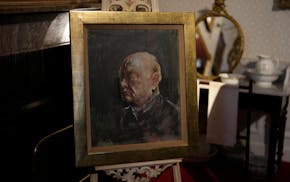Tara Westover grew up on a mountainside in Idaho, a daughter of Mormon survivalists. She and most of her six siblings were born at home and had no birth certificates, no Social Security numbers. The government didn't know they existed, and that was the way their father wanted it.
The family stockpiled food, guns and gasoline in preparation for the End Times. Tara never attended school but spent her childhood working in her father's junkyard and helping her mother brew homeopathic remedies to sell.
Tara's father was sadistic and domineering, and her older brother Shawn (a pseudonym) assaulted her repeatedly — choking her to unconsciousness, dragging her by her hair, jamming her head into the toilet — to punish her for sassing, or for her "whorish" ways (such as talking to a boy).
Westover recounts all of this in her fascinating memoir, "Educated," which is about growing up in a violent, chaotic home, and then breaking away from it. It is also about the deep, innate pull of family — the need to be loved and protected by one's parents, even when that is beyond possibility.
Westover was a remarkably determined child. "I wanted to get away from the junkyard and there was only one way to do that … by getting a job," she writes. "The trouble was, I was eleven." She starts babysitting, and then bagging groceries, but always her father pulls her back to the junkyard, a dangerous place where one brother was seriously burned, and another was badly injured in a 20-foot fall.
At age 16, inspired by an older brother, she buys textbooks, somehow teaches herself enough algebra and trigonometry to pass the ACT and heads off to college.
She was still woefully ignorant — she had never heard of the Holocaust, she thought Europe was a country, and her writing style was "oddly formal and stilted," inspired, as it was, by the only reading material she knew: the Bible, the Book of Mormon and speeches by Brigham Young.
With support from professors, and her own steely will, this feral girl graduated from Brigham Young University and went on to attend the University of Cambridge in England and, eventually, earned a doctorate from Harvard University.
The memoir is divided into three parts — childhood, college and present-day. The most powerful section is the first, which Westover writes from the point of view of herself as a girl. She recounts her bizarre life dispassionately, as though it was perfectly ordinary, and it is that sense of normality that gives this section its power.
Part Two is about Tara's awakening: As she begins to understand the world around her, she begins to realize that she's a freak.
It is the third section that is the most difficult to read — the least polished, the most painful, perhaps because it is the most recent. It lacks distance, both temporal and emotional. Many of the events she relates are as yet unresolved, because, as she says, she wanted to write "in the chaos of events still unfolding, not in the calm of resolution."
This might not have been the wisest decision.
Although her father grew increasingly erratic and Shawn increasingly violent (he killed the family dog with a knife while Shawn's son watched, screaming, and then pressed the bloody knife into Tara's hand as a warning), Westover traveled home to Idaho repeatedly, hoping always that her family would accept her new life and that Shawn and her father somehow would have changed.
This terrible, vulnerable hope — this desperate need to be part of her family despite everything — is the saddest part of the book. Westover seems not to understand that her family is less family than cult, and that free will and free speech are not part of the equation. She is heartbroken when her older sister — who also was terrorized by Shawn — first confides in her, then shuns her. She is heartbroken once again when her mother refuses to see her. And still she goes back.
In the end she seems to accept that in order to be her own person, she must break with her family. But the rawness of this last section suggests that despite her amazing transformation and this powerful book, Westover's remarkable education is not yet complete.
Laurie Hertzel is senior editor for books at the Star Tribune. facebook.com/startribunebooks • Twitter: @StribBooks
Educated
By: Tara Westover.
Publisher: Random House, 334 pages, $28.
Salman Rushdie's 'Knife' is unflinching about his brutal stabbing and uncanny in its vital spirit
ABBA, Blondie, and the Notorious B.I.G. enter the National Recording Registry

